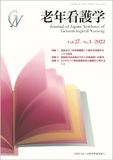Japanese
English
- 販売していません
- Abstract 文献概要
- 参考文献 Reference
抄録
本研究の目的は,認知機能の低下によってインスリン自己注射の介助が導入された時期の高齢者の状況と,そのような高齢者へ行っている看護援助を明らかにすることである.この時期の高齢者の看護援助経験のある看護師23人に半構造的面接法によるデータ収集を行い質的記述的に分析した.その結果,看護師のとらえた高齢者の状況として【血糖コントロールにつながるインスリン自己注射はできていない】【いまはインスリン自己注射はできているつもりでいる】【インスリン自己注射に関して周囲や家族と距離をおいてやっている】【介助の導入を自分なりに納得して受け入れる】の4カテゴリー,看護援助として【認知機能の低下でインスリン自己注射ができなくなることを想定して関わる】【自宅でインスリン自己注射が継続できる方法を検討する】【家族からインスリン自己注射の介助が受けられるよう働きかける】【納得できる自己決定を支援する】の4カテゴリーが抽出された.高齢者の思いを尊重しながら介助を導入する援助の必要性が示唆された.
The purpose of this study is to clarify the situation with elderly diabetic patients who are at the stage of receiving assistance for insulin self-injection because of decreased cognitive function, as well as the types of nursing support conducted. A qualitative descriptive analysis was performed on data collected through semi-structured interviews with 23 nurses who have experience caring for older diabetics in this stage, which revealed four categories of nurses' observations that characterized such patients: “inability to inject themselves with insulin conducive to glycemic control,” “insistent belief that they are still capable of managing self-injection,” “Isolating themselves from others with regard to self-inject insulin,” and eventually “learning to accept the introduction of care.” Furthermore, it revealed 4 categories of nursing care for them: “interactions with patients under the premise that cognitive decline impairs abilities for self-injection,” “investigating methods to help patients continue injecting themselves at home,” “involving the family to encourage the patient to accept injection care,” and “support to promote autonomous decision-making based on patient understanding and acceptance.” This analysis highlighted the importance of introducing insulin injection-related interventions while respecting the emotions and dignity of older adults.
Copyright © 2022, Japan Academy of Gerontological Nursing All rights reserved.


